As the senator representing North and Central America in the Italian Parliament for seven of the last 12 years, Renato Turano fought fiercely for his constituents and made great strides on their behalf.
As Renato Turano’s illustrious career as an Italian senator comes to close, he returns to his life in America with a suitcase full of memories and accomplishments.
First elected in 2006 to represent North and Central America in the Italian Senate, he joined an elite band of six senators and 12 deputies voted in by 5 million Italian citizens scattered across six continents.
That monumental task became deeply personal his first day on the job.
“When I was a young man, my father told me that I should maintain ties with Italy because I might go back to work there some day,” Turano recalls. “So there I was, walking down the corridors of the Italian Parliament with the guards calling me by my name and my eyes were filling with tears as I thought about how proud my father would have been. He was right — I did return to Italy to work — but he never could have imagined that I would be returning as a senator!”
Just as that realization was sinking in, the doors to the senate chamber swung open to a scene of utter chaos, with senators yelling and phones ringing. “That’s when I knew I had my work cut out for me,” he says with a laugh.
And work he did. From 2006 to 2008 and again from 2013 to the present, he and his compatriots carved out an ambitious agenda and managed to bring most of it to fruition.
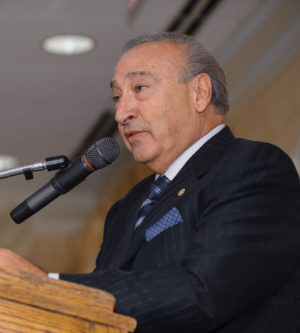 Among their many objectives, they fought to increase funding to Italian consulates and improve consular services; enhance cultural programs from Italy and make them more accessible to the community; increase funding to language programs on the elementary, middle and high school levels, and to organizations that offer language courses; subsidize Italian-language newspapers, radio shows, and television programs; promote exchanges between Italian and American universities; facilitate economic exchanges between Italy and the rest of the world; and restore citizenship to those who had to renounce it to become citizens of other countries.
Among their many objectives, they fought to increase funding to Italian consulates and improve consular services; enhance cultural programs from Italy and make them more accessible to the community; increase funding to language programs on the elementary, middle and high school levels, and to organizations that offer language courses; subsidize Italian-language newspapers, radio shows, and television programs; promote exchanges between Italian and American universities; facilitate economic exchanges between Italy and the rest of the world; and restore citizenship to those who had to renounce it to become citizens of other countries.
Few in number, they knew they had to build a broad base of support to achieve their lofty goals. To that end, Turano and his fellow senators from abroad banded together with a dozen Italian counterparts to create the Comitato per le Questioni degli Italiani all’Estero, a Senate-approved committee dedicated to addressing the concerns of Italians living around the world.
“There was an air of excitement back then, because it was the first time that Italians abroad had representation and everybody was interested to see how it would work out,” he says. “We were able to legitimize the needs of our constituents and demonstrate that we had as much to offer the Italian government as it had to offer us.”
But the going got tough as the nation descended into a major recession.
“In 2013, the Italian economy shrank by 2.5 percent,” Turano explains. “The government was looking to cut wherever they could and services to Italians living abroad were on the chopping block along with everything else.”
Against all odds, Turano and his compatriots were able to wrestle annual funding increases on all fronts from 2013 to 2018.
“Imagine what would have happened if we weren’t there,” he muses. “At best they would have maintained funding and most likely they would have lost ground — There certainly wouldn’t have been increases every year.”
They won the day by underscoring the many benefits that Italy derives from its “cittadini all’estero.”
“We’re a great resource — we buy Italian products and bring our tourism dollars home — and we’re ambassadors for Italian products and culture,” Turano points out. “The funds that Italy devotes to its citizens abroad are a drop in the bucket compared to what Italy receives in return.”
And there was a surprisingly personal dimension to the decision-making process.
“You have to remember that most regions in Italy have lost tens of thousands of their citizens to emigration,” Turano notes. “Everyone in Parliament knows someone who lives in another country. So they wouldn’t be cutting funding to strangers, they’d be cutting funding to family.”
Turano is particularly proud of the support he and his compatriots were able to offer to Italy’s consular system. “They were going to close four offices in North American alone,” he says. “We were able to limit the closing to just one.”
He’s also proud of the sister-college relationship he helped to create between the University of Wisconsin-Parkside and the University of Calabria, one that has sent more than 100 American students to study in Italy and vice versa.
“What first got me interested (in running for the Senate) were all the younger Italian Americans who wanted to maintain their ties to Italy despite being fifth and sixth generation,” he explains. “I wanted to do what I could to increase access to Italian language and culture. I think we made tremendous strides in that area.”
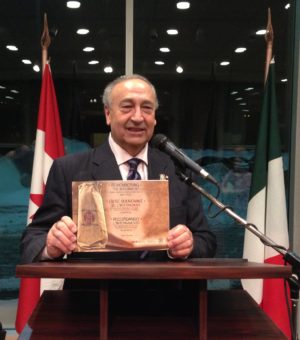 His darkest days as a senator came during the round of constitutional changes that were proposed in 2014, when his own party moved to dismantle the Senate and eliminate representation abroad. He became a dissident in his own party, arguing passionately against the changes.
His darkest days as a senator came during the round of constitutional changes that were proposed in 2014, when his own party moved to dismantle the Senate and eliminate representation abroad. He became a dissident in his own party, arguing passionately against the changes.
“We were able to sway enough votes to prevent the three-quarter majority needed for passage,” Turano points out with pride. “When the changes were put before the Italian people in a referendum, 62 percent voted against it.”
Turano’s great regret was not being able to pass a law restoring citizenship to those who were forced to abandon it to become citizens of other countries. But there’s cause for hope even there.
“We planted the seed and we had a lot of support among the senators, but the government wouldn’t put it on the agenda,” he explains. “I’m counting on my successor to lead the charge for this important piece of legislation.”
Turano certainly won’t miss what he calls the “meaningless polemics” of politics in Italy. “The opposition didn’t object on principle, they objected just to object,” he ruefully recalls. “It was such a waste of time.”
But the many friendships he made while in office more than compensated for any frustrations he encountered along the way.
“It was fabulous,” he enthuses. “We really came together as a group to work toward a common goal. We were able to set aside our personal differences to defend the rights of the citizens who we represented.
“I’m proud of the fact that I voted my conscience and not so much what the party wanted,” he concludes. “It was a great honor to represent the Italians in all of North and Central America. It’s a privilege I’ll never forget.”
The above appeared in the March issue of the print version of Fra Noi. Our gorgeous, monthly magazine contains a veritable feast of news and views, profiles and features, entertainment and culture. To subscribe, click here.
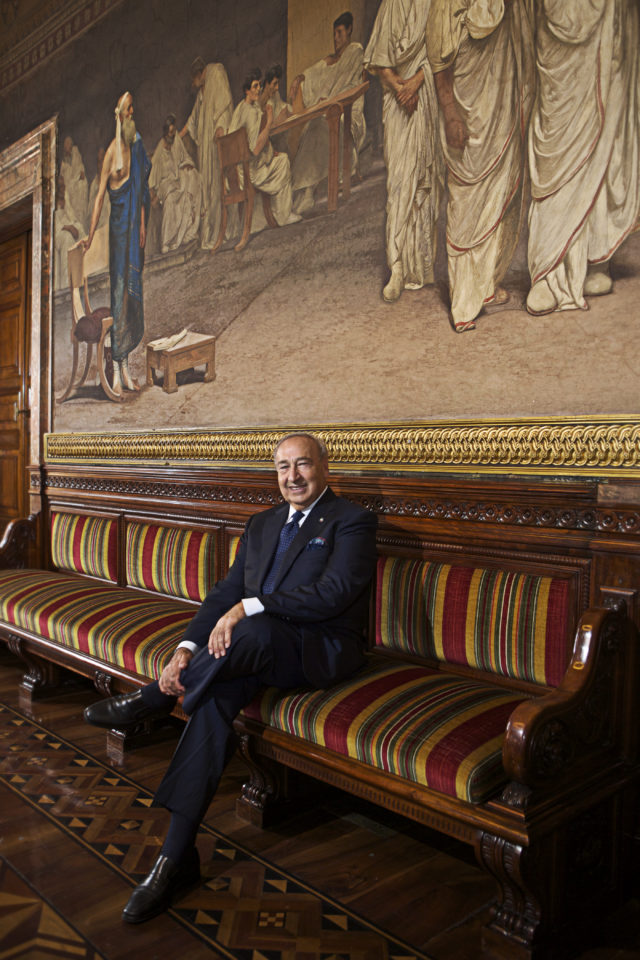
 Fra Noi Embrace Your Inner Italian
Fra Noi Embrace Your Inner Italian


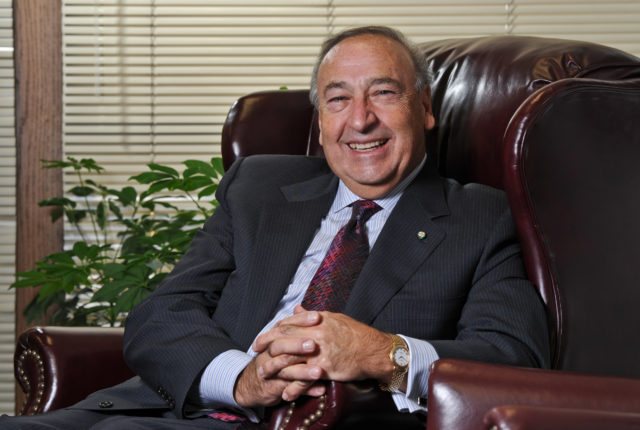
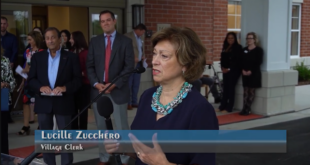




3 comments
Pingback: Renato 'Ron' Turano, leader of Berwyn's Turano Baking Co. also held seat in Italy's SenateMaureen O'Donnellon December 10, 2021 at 11:30 am - ThingsToDoInChicago.co
Pingback: Matt Renato 'Ron' Turano di Turano Baking Co, ha anche tenuto un seggio al Senato italiano
Pingback: Renato 'Ron' Turano, de Turano Baking Co., est décédé et siégeait également au Sénat italien - Blog Voyage